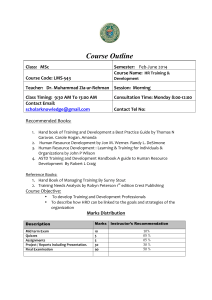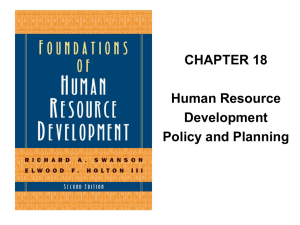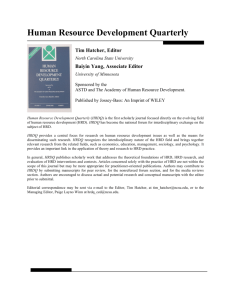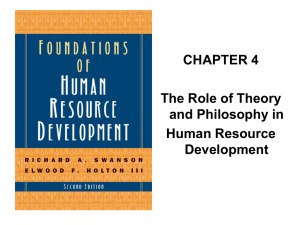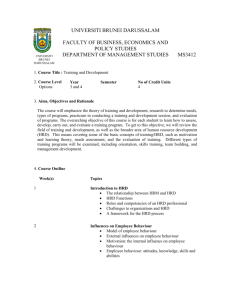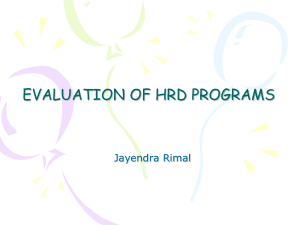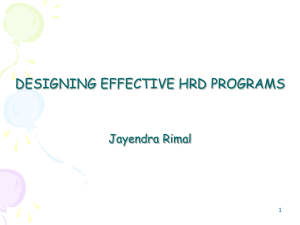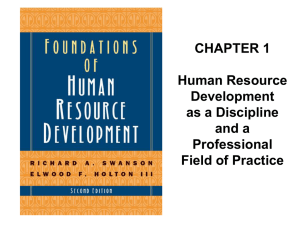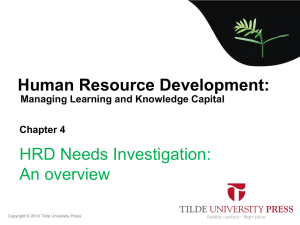HRD2010 Module Outline - MBAHRD 2010
advertisement
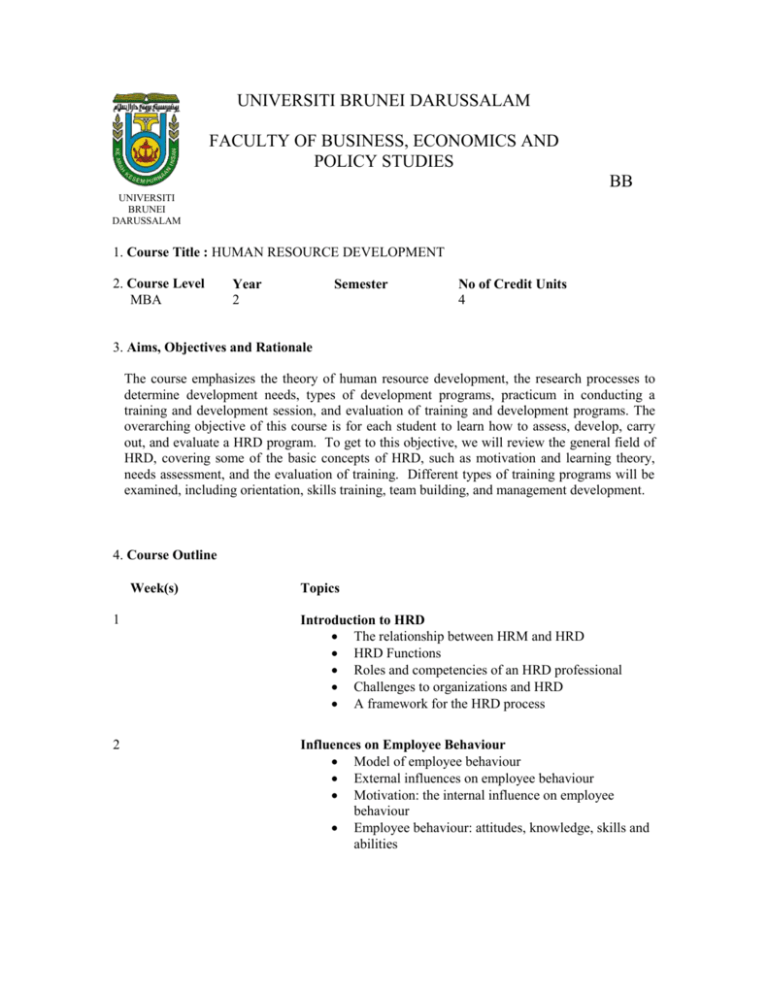
UNIVERSITI BRUNEI DARUSSALAM FACULTY OF BUSINESS, ECONOMICS AND POLICY STUDIES BB UNIVERSITI BRUNEI DARUSSALAM 1. Course Title : HUMAN RESOURCE DEVELOPMENT 2. Course Level MBA Year 2 Semester No of Credit Units 4 3. Aims, Objectives and Rationale The course emphasizes the theory of human resource development, the research processes to determine development needs, types of development programs, practicum in conducting a training and development session, and evaluation of training and development programs. The overarching objective of this course is for each student to learn how to assess, develop, carry out, and evaluate a HRD program. To get to this objective, we will review the general field of HRD, covering some of the basic concepts of HRD, such as motivation and learning theory, needs assessment, and the evaluation of training. Different types of training programs will be examined, including orientation, skills training, team building, and management development. 4. Course Outline Week(s) Topics 1 Introduction to HRD The relationship between HRM and HRD HRD Functions Roles and competencies of an HRD professional Challenges to organizations and HRD A framework for the HRD process 2 Influences on Employee Behaviour Model of employee behaviour External influences on employee behaviour Motivation: the internal influence on employee behaviour Employee behaviour: attitudes, knowledge, skills and abilities 3 Learning and HRD Learning and instruction Maximising learning Individual differences in the learning process Learning strategies and styles Recent development in instructional and cognitive psychology 4 Assessing HRD Needs Introduction: definition and levels of needs analysis Strategic and organisational analysis Task analysis Person analysis Prioritising HRD needs 5-6 Designing HRD Programmes Defining objectives “Make vs Buy” decision Selecting the trainer Preparing a lesson plan Preparing training materials Scheduling the HRD programme 7 Implementing HRD Programmes Training delivery methods “On-the-job” methods Classroom training approaches Computer-based training Media and methods 8 Evaluating HRD Programmes The purpose of HRD evaluation Models and frameworks of evaluation Data collection for HRD evaluation Research design Ethical issues in evaluation research 9 Employee Socialization and Orientation Socialization: becoming an organizational member Perspectives on the socialization process The realistic job preview Employee orientation programmes 10 Skills and Technical Training Basic workplace competencies Skills and literacy programmes Technical training Interpersonal skills training Professional development and education 11 Coaching and Performance Management The need for coaching Definition of coaching Coaching to improve performance Coaching skills Coaching effectiveness 12 Employee Counselling and Wellness Services An overview of counselling programmes Employee assistance programmes Stress management interventions Employee wellness and health programmes Issues in employee counselling 13 Career Management and Development Career concepts Stages of life and career development Models of career development The process of career management Roles in career management Career development practices and activities 14 Management Development Management roles and competencies Management education Management training and experiences Designing effective management development programmes 5. Prerequisite(s) Human Resource Management 6. Assessment Scheme Coursework Final Examinations 50% 50% 7. Course Method (Lectures) Lectures will introduce the concepts and discuss the implications while presentations and discussions will be the platform for clarifying issues. 8. Course Coordinator Dr. Ali Yusob bin Md Zain Room 1.23 at FBEPS Tel: 2463001 ext 1113 Email:ali.zain@ubd.edu.bn; aliyusob@gmail.com 9. Course Materials Text Werner J.M., & DeSimone, R.L (2006). Human resource development (4th. Ed.). Mason, Ohio: South-Western Other relevant books Noe, R. A. (2008). Employee training and development, 4th. Ed.Boston: McGraw-Hill Blanchard, P.N., & Thacker, J.W. (1999). Effective training: Systems, strategies and practices. New Jersey: Prentice Hall O’Connor, B. N., Bronner, M, & Delaney, C. (2002). Training for organizations. Mason, Ohio: South-Western. Selected Relevant Journals International Journal of Training and Development Human Resource Management Review Course Blog http://mbahrd2010.wordpress.com/ INDIVIDUAL PROJECT ASSIGNMENT Assignment: To prepare a training proposal which includes the following processes: planning, designing, delivering, and evaluating of an original training program. Process: 1. Each STUDENT will select his/her own topic for a training program. The topic should be one in which the student has considerable interest (or expertise). 2. Using Chapter 4 as a guide, each student will explain how he/she would conduct a needs assessment for the proposed training program. Make clear in your write-ups what interview questions, questionnaires, etc. you will be using. 3. Based on your needs assessment and any assumptions you may need to make, develop specific training objectives. 4. Develop a detailed Training Proposal (Project Plan). This should include: a. b. c. d. e. f. Title and brief description of the program Training objectives Training methods to be used, and a rationale (justification) for using them, based on training theory A training outline A list and description of training materials needed An evaluation plan (including both short-term and long-term evaluation, where appropriate; see Ch. 7) 5. Based on your Training Proposal (Project Plan), you will then prepare for your class presentation. Presentations should review your efforts to develop and evaluate the training program, and must include some demonstration of the training program to the class (you may only have time to present a section or module of the training to the class). Final Reports for all students are due on the last week of the semester (i.e. the week before the revision week), and must include all information on your needs assessment (task analysis), design, implementation, and evaluation plans. 6. Grading of this project will be as follows: Presentation Final Report 20 points 20 points
